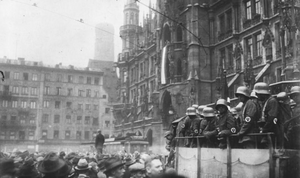October 13 coup d'état
| October 13 coup d'état | |||||||
|---|---|---|---|---|---|---|---|
 | |||||||
| |||||||
| Belligerents | |||||||
| Slavic government | |||||||
| Commanders and leaders | |||||||
| Dominique Ozerov |
Nikifor Osipov Nikola Milošević Myron Matveyev Hleb Biryukov | ||||||
| Casualties and losses | |||||||
| 46 of Orezov's body guards, including Orezov himself | |||||||
| 132 in total during the coup | |||||||
The October 13 coup d'état was a coup d'état staged by Nikifor Osipov, the Slavic Union Party, and the Okhrana Zala. Code-named Operation Perun, the coup dissolved the Senate and replaced it with the Duma, which had practically no powers to oppose Osipov, along with granting Osipov dictatorial powers.
Osipov had slowly consolidated power over the years, and in 1936 he is widely suspected to be the mastermind behind a failed coup attempt lead by several military officers who had served under him during the Slavic Civil War, but there was not enough evidence to remove him from power.
Late October 12th multiple members of the began the coup with the murders of multiple government officials, the following morning they seized several strategically important building and laid siege to the presidential mansion under the command of Osipov. Before long Osipov dissolved the senate and wrote a new constitution.
Background
In April of 1936 the Okhrana Zala, which was a group formed by Osipov dedicated to bringing him to power, attempted a coup against the republican government, but Vysoblastmarshal Kondrat Kovalev informed the Slavic government of the plot and it failed miserably,
The Coup
Noch' krovi
Late in the night on October 12th 1940 the Okhrana Zala began what has been referred to as the "Noch' krovi" (English: night of blood), in which they murdered several prominent politicians and potential political opponents, these murders were coordinated by Gruppmarshal Myron Matveyev, who himself lead a small group of Okhrana Zala agents in a raid on the home of General Sergey Kasputin, the highest ranking member of the military believed to be anti-Osipovist, and had him and his family killed, in total it is estimated that 85 people were killed on Noch' krovi.
Battle of Adrikagorod
At approximately 5:00 am a fleet under the command of Admiral Hleb Biryukov seized the port at Noyalensk, which was one of the most important in the nation, from there he strategically positions ships and troops along the coast. By 6:00 am President Dominique Ozerov had been notified of the murders and barricaded himself in the presidential mansion with his bodyguards. From here Nikola Milošević commanded the Okhrana Zala in it's attempts to seize strategically important locations in Adrikagorod. By 8:00 am, the Okhrana Zala had taken most radio stations in the city; the President received incomplete information and was unable to tell how large the coup was.
Ozerov attempted to contact Sergey Kasputin to organize a response to the attacks, Ozerov had no idea that Kasputin had been killed the night before. By 9:00 am the Okhrana Zala had seized several government buildings, the airport, all radio and television stations, and had set up checkpoints on the outskirts of the city to prevent Ozerov from attempting to flee the city.
At 9:30 the garrison at Fort Adrika, the Republic's last hope for repelling the coup, declared it's full support for the coup and surrendered to the Okhrana Zala. 15 minutes later Nikifor Osipov went on the radio to declare the dissolution of the First Slavic Republic and the creation of the Slavic Union. Despite the lack of any military support, Ozerov refused to resign his office.
By 10:00 am the Okhrana controlled the entirety of the capital except for the city center, Nikifor Osipov demanded Ozerov surrender, when Ozerov refused he ordered an armoured and infantry force under Milošević to advance upon the presidential mansion, they were initially repelled by snipers perched on the rooftops but after a half hour of shelling of the mansion by artillery another advance was made, this time breaching the mansion. The Okhrana fought their way through the building only to find President Ozerov dead in his office, having been killed by the artillery shelling.
Aftermath
Installing a new regime
On October 14th Nikifor Osipov established a military junta with himself at it's head, in the following days the junta dissolved the Senate, outlawed all political parties except for the Slavic Union Party, and all political activity was declared "in recess". Hundreds of suspected political opponents were arrested and many were executed.
The initial leaders of the junta were Nikifor Osipov, Nikola Milošević, Myron Matveyev, and Hleb Biryukov; by October 23 the junta was dissolved and Osipov named himself Vozhd, later giving several members of the coup massive promotions and awarding all three of the other junta members the Hero of the Union, the highest distinction in the country.